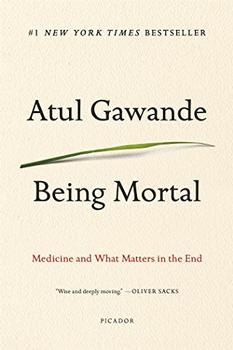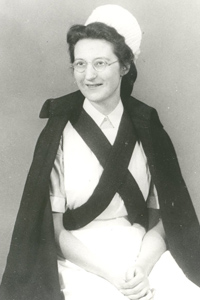Summary | Excerpt | Reading Guide | Discuss | Reviews | Beyond the Book | Read-Alikes | Genres & Themes | Author Bio

Medicine and What Matters in the End
by Atul GawandeThis article relates to Being Mortal
Hospice is a medical specialty that focuses on end-of-life care for individuals and support for their families. Its roots come from the Latin for hostis meaning stranger, and more specifically from hospitem meaning a guesthouse - from these roots we also get hospital, hotel and hospitality.
The idea of caring for those suffering from fatal diseases has been around for centuries. In the Middle Ages, religious orders established shelters along pilgrimage routes designed to aid those journeying to and from sacred sites, many of whom were terminally ill, and are considered the original form of hospice care. The idea was expanded in the 16th through 18th centuries, when monasteries began opening facilities for those who were impoverished and dying. In the 1800s, Madame Jeanne Garnier of Lyon, France founded the Dames de Calaire to care specifically for the dying (the first time the distinction was made), and in 1879, Mother Mary Aikenhead of the Irish Sisters of Charity opened Our Lady's Hospice in Dublin.
 The first modern hospice, St. Christopher's Hospice in London, was opened by Dame Cicely Saunders in 1967. Saunders is credited with introducing the concept of treating the "total pain" endured by the dying – physical, emotional and spiritual. She was the first to emphasize that care should be provided by a team of supportive individuals – not just physicians – and should extend to the patient's family. She also was the first to provide opiates to dying individuals on a schedule so that the medication arrived before the pain, whereas previously the drugs were only provided to patients after pain had returned. Saunders visited Yale University in Connecticut at the invitation of one of its graduating classes, and so inspired her audience that in 1974 New Haven Hospice (now Connecticut Hospice) opened the first hospice facility in the United States based on her theories about caring for those who are terminally ill.
The first modern hospice, St. Christopher's Hospice in London, was opened by Dame Cicely Saunders in 1967. Saunders is credited with introducing the concept of treating the "total pain" endured by the dying – physical, emotional and spiritual. She was the first to emphasize that care should be provided by a team of supportive individuals – not just physicians – and should extend to the patient's family. She also was the first to provide opiates to dying individuals on a schedule so that the medication arrived before the pain, whereas previously the drugs were only provided to patients after pain had returned. Saunders visited Yale University in Connecticut at the invitation of one of its graduating classes, and so inspired her audience that in 1974 New Haven Hospice (now Connecticut Hospice) opened the first hospice facility in the United States based on her theories about caring for those who are terminally ill.
Also hugely influential on the evolution of hospice care was the publication of Dr. Elisabeth Kubler-Ross's book On Death and Dying in 1969. In it, Kubler-Ross included interviews with over 500 people who were dying, and provided her readers with new insight into the hurdles people face when they're terminally ill. She argued that the focus should be on better home care as opposed to an institutional setting, and that patients should be permitted to participate as much as possible in decisions about their healthcare.
In 1986, the United States Congress made a hospice benefit a permanent addition to Medicare.
Today, hospice care can vary from organization to organization; there's not one overall governing body that regulates what care terminally ill patients and their families receive. Some hospices are for-profit, but many rely on Medicare only and provide free services. In general, however, they all strive to provide "team care," involving not only medical staff but social workers, bereavement counselors, clergy, and volunteers who support not only the patient but his or her family as well. Hospice care can be provided in a facility or the individual's home. There are currently over 3000 local hospice and palliative care programs in the United States alone.
Hospice is authorized by a person's physician when it's deemed he or she has less than six months to live. It provides a wide range of care individually tailored to the patient's wishes, beliefs, values, social situations and personality. According to the National Hospice and Palliative Care organization, services may include:
Those who've taken advantage of hospice care almost universally tout its benefits; nevertheless, misconceptions are prevalent. Many are reluctant to contact a hospice organization because it requires acceptance of death (their own or that of a loved one). In addition, some feel that hospice programs are associated with hastening or prolonging death, neither of which is the case; hospice merely strives to ensure that as one dies, one's quality of life is as good as possible. It's also not just about pain management or only for those suffering from cancer; the programs are designed to support both the patient and the patient's family members as completely as possible under the circumstances.
Picture of Dame Cicely Saunders from St. Christopher's
Filed under Society and Politics
![]() This "beyond the book article" relates to Being Mortal. It originally ran in June 2015 and has been updated for the
September 2017 paperback edition.
Go to magazine.
This "beyond the book article" relates to Being Mortal. It originally ran in June 2015 and has been updated for the
September 2017 paperback edition.
Go to magazine.
Your guide toexceptional books
BookBrowse seeks out and recommends the best in contemporary fiction and nonfiction—books that not only engage and entertain but also deepen our understanding of ourselves and the world around us.